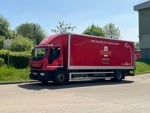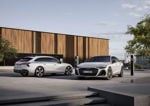With the Government encouraging a 'polluter pays' policy, now is the time for fleets to consider alternative fuels. The UK's reserves of natural gas beneath the North Sea and across Europe mean there is no danger of compressed natural gas (CNG) running out quickly, unlike supplies of fossil fuels such as petrol and diesel. Typically, natural gas-powered vehicles have 20% lower levels of carbon dioxide, 87% reduction in oxides of nitrogen and 70% reduction in non-methane organic gas.
In the Budget, Chancellor of the Exchequer Gordon Brown slashed 3p per litre (13p per gallon) off the duty on road fuel gases. Mobil CNG used the show to focus fleets on the advantages of alternative fuels such as compressed natural gas (CNG). Tom Jaworski, manager of Mobil CNG, said: 'The UK's size and infrastructure makes it an ideal candidate for developing and running CNG fleets. Most economic activity is concentrated in a relatively small number of areas allowing delivery vehicles to use the 'return to base' model so fleets can refuel from a single location.'
The BG Group launched its new Iqara natural gas vehicle (NGV) product. Michael Kesztenbaum, head of Iqara, said: 'The recent changes in the Budget confirm our view that natural gas is the winning option for fleet operators in the UK today. We can offer a fuel that saves operators money and at the same time reduces noise and emissions.' Iqara is also planning to develop a nationwide infrastructure of refuelling sections, building on its number of on-site depot-based refuelling points.
Calor Autogas announced a new deal to supply liquefied petroleum gas to home improvements company Everest's 600-vehicle fleet. Everest operates a fleet of 50 gas-powered Ford Transit vans, with 40 LDV vans in production and a further 15 Mercedes-Benz Sprinter vans on order, all of which are hoped to be gas-powered. LPG costs about 50% less than petrol or diesel and offers reduced emissions as well as improving fuel efficiency. The cost to Everest of converting to alternative fuels was reduced by grants from the Energy Saving Trust's TransportAction PowerShift programme.
















Login to comment
Comments
No comments have been made yet.